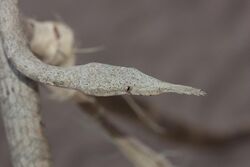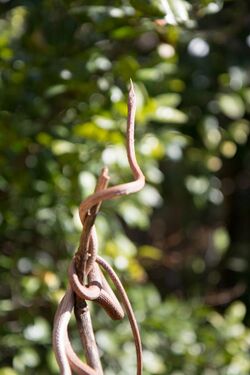Biology:Langaha madagascariensis
| Langaha madagascariensis | |
|---|---|

| |
| Female L. madagascariensis | |
| Scientific classification | |
| Domain: | Eukaryota |
| Kingdom: | Animalia |
| Phylum: | Chordata |
| Class: | Reptilia |
| Order: | Squamata |
| Suborder: | Serpentes |
| Family: | Pseudoxyrhophiidae |
| Genus: | Langaha |
| Species: | L. madagascariensis
|
| Binomial name | |
| Langaha madagascariensis Bonnaterre, 1790
| |
| Synonyms | |
| |
Langaha madagascariensis (formerly Langaha nasuta, commonly known as the Madagascar or Malagasy leaf-nosed snake) is a medium-sized highly cryptic arboreal species. It is endemic to Madagascar and found in deciduous dry forests and rain forests, often in vegetation 1.5 to 2 meters above the ground.[1][3]
Description
Malagasy leaf-nosed snakes can grow up to 1 meter in length.[3] There is considerable sexual dimorphism within the species; the males are dorsally brown and ventrally yellow with a long tapering snout, while the females are mottled grey with a flattened, leaf shaped snout.[4] The function of their appendage is unknown, but obviously also serves as camouflage.[3]
It is largely a sit-and-wait predator. It may show curious resting behaviour, hanging straight down from a branch. Prey items include arboreal and terrestrial lizards.[5] It also exhibits hooding while stalking prey. These hooding and swaying behaviours along with its cryptic colour patterns, might allow L. madagascariensis to mimic a vine swaying in the wind.[6]
Leaf-nosed snakes are oviparous with clutch sizes ranging from 5 to 11 eggs.[3] Malagasy leaf-nosed snakes are generally calm and reluctant to bite unless provoked. Envenomation by the snake causes severe pain in humans, but is not deadly.[7]
References
- ↑ 1.0 1.1 Raxworthy, C.J. (2011). "Langaha madagascariensis". IUCN Red List of Threatened Species 2011: e.T172813A6922957. doi:10.2305/IUCN.UK.2011-2.RLTS.T172813A6922957.en. https://www.iucnredlist.org/species/172813/6922957. Retrieved 12 November 2021.
- ↑ Langaha madagascariensis at the Reptarium.cz Reptile Database. Accessed 3 May 2015.
- ↑ 3.0 3.1 3.2 3.3 Glaw, Frank; Vences, Miguel (2007). A Field Guide to Amphibians and Reptiles of Madagascar (3rd ed.). Köln: M. Vences & F. Glaw Verlags GbR. ISBN 978-3-929449-03-7.
- ↑ Andrew Durso (February 7, 2013). "Malagasy Leaf-nosed Snakes". Life is Short, but Snakes are Long. http://snakesarelong.blogspot.com/2013/02/malagasy-leaf-nosed-snakes.html.
- ↑ Tingle, Jessica L. (2012). "Field observations on the behavioral ecology of the Madagascan leaf-nosed snake, Langaha madagascariensis". Herpetological Conservation and Biology 7 (3): 442–448. http://herpconbio.org/Volume_7/Issue_3/Tingle_2012.pdf.
- ↑ Kenneth L. Ksyco (2005). "Feeding behaviour of the Madagascar leaf‐nosed snake, Langaha madagascariensis (Serpentes: Colubridae: Pseudoxyrhophiinae), with an alternative hypothesis for its bizarre head structure". African Journal of Herpetology 54:2 (2): 195–200. doi:10.1080/21564574.2005.9635534.
- ↑ D'Cruze, Neil C. (2008). "Envenomation by the Malagasy colubrid snake Langaha madagascariensis". Journal of Venomous Animals and Toxins Including Tropical Diseases 14 (3): 546–551. doi:10.1590/S1678-91992008000300014.
Wikidata ☰ Q2713664 entry



